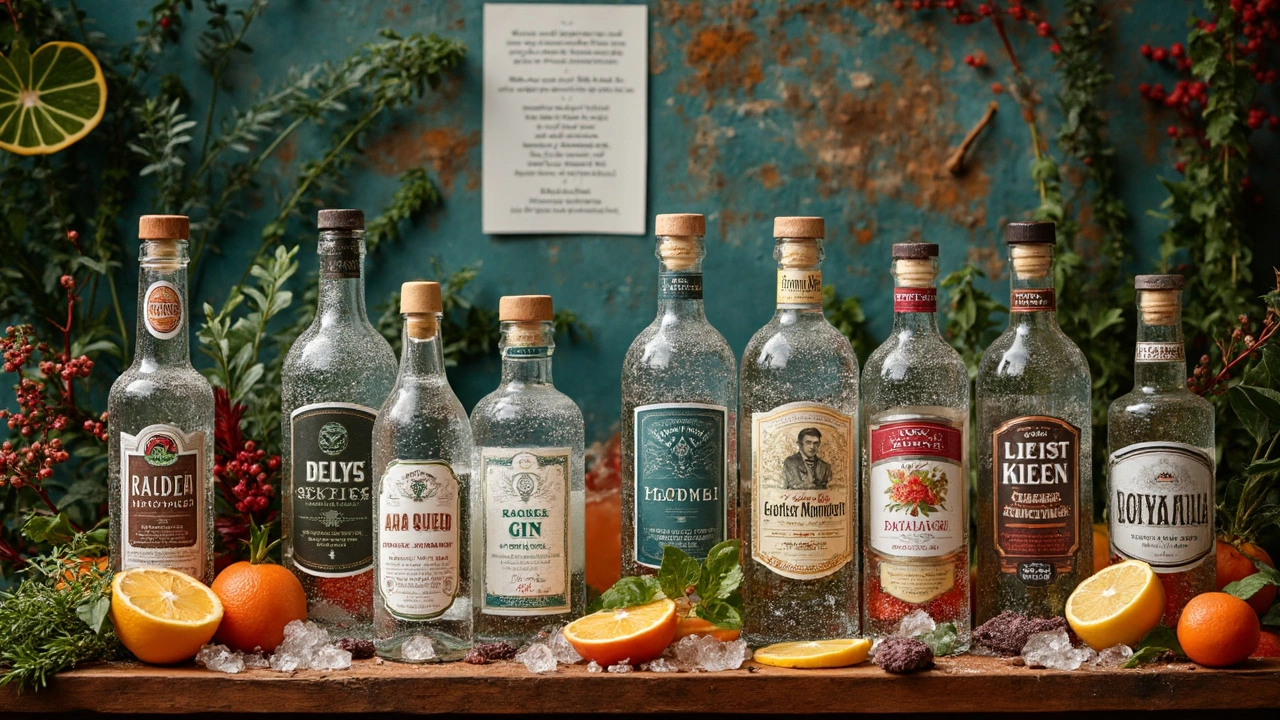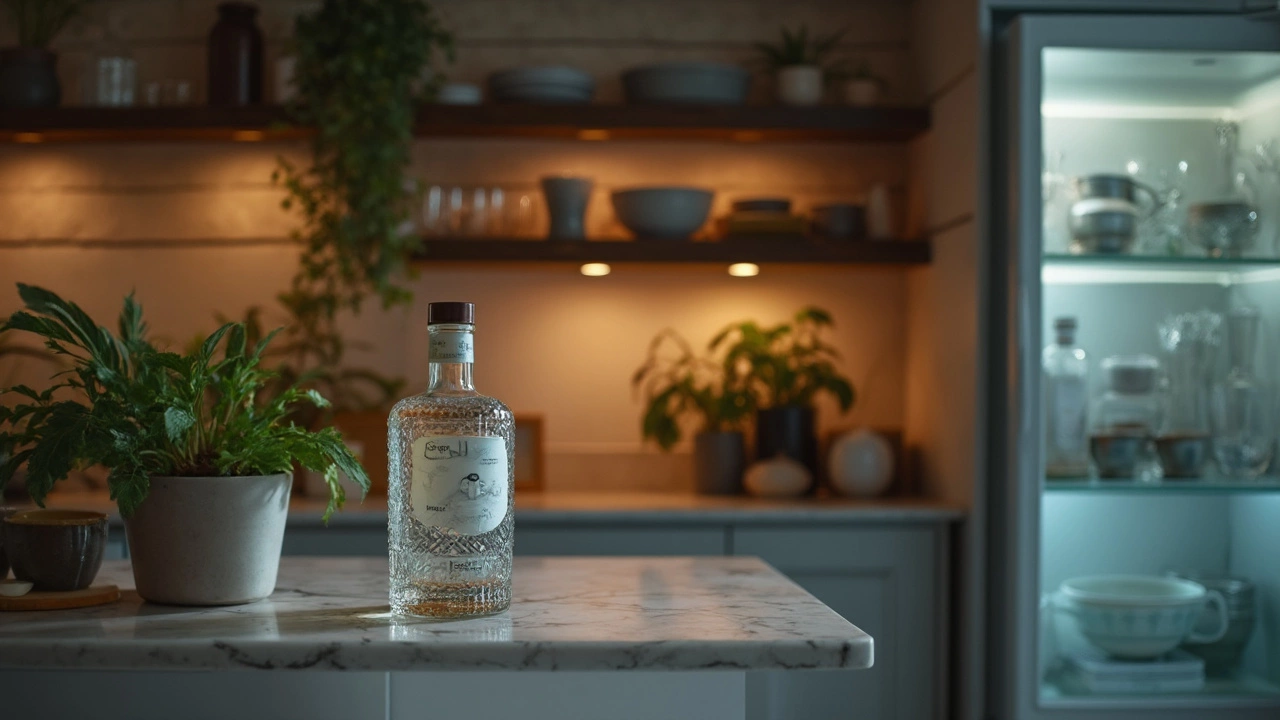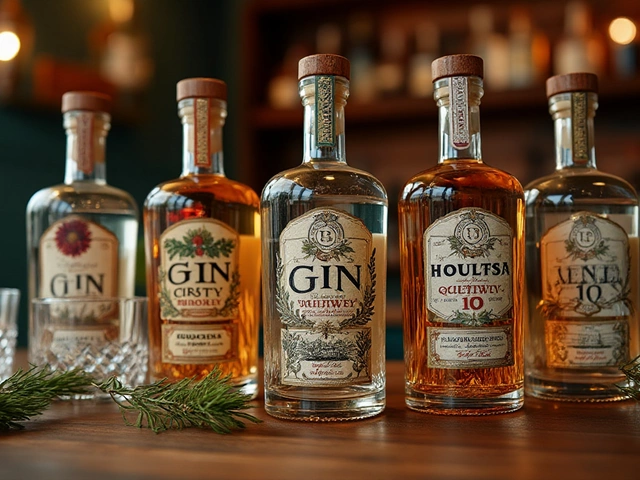Ever grabbed a bottle of gin at a friend’s place and noticed it was ice-cold from the fridge—and then found an unopened dusty one at home, sitting at room temperature for months? You’re not the only one who’s wondered if gin is supposed to be chilled. The answer isn’t as simple as you might think, and there’s a wild mix of science, tradition, and even a bit of taste bud trickery behind this debate. People argue about the right way to store gin with the same level of passion they bring to the perfect martini recipe. Gin is a fascinating spirit, with botanicals and delicate flavors you don’t want to mess up. So, does that mean you should stick it in the fridge, or just leave it on a shelf? Buckle up, because the answer is more practical than you’d expect—and could actually change your next gin and tonic.
The Science of Gin Storage: Does Temperature Really Matter?
Here’s something that surprises a lot of people: Unlike wine or beer, gin is a high-proof spirit, and with its alcohol content often sitting at 40% ABV or higher, it isn’t prone to quick spoilage. The alcohol acts as a preservative, making gin pretty stable on the shelf. But stability doesn’t mean taste stays the same under all conditions. A key reason people put gin in the fridge is chilled drinks just taste different. Cold temperatures dull some flavors and aromas, which can be a good or bad thing, depending on how you’re drinking your gin. Serving gin straight from the fridge can tone down sharp botanical notes, making it smoother. That’s why some folks swear by chilled gin for martinis or sipping neat—especially if you’ve got a bottle that leans towards piney or citrus-heavy notes. On the flip side, if you want your gin’s complexity front and center, grab it from the shelf at room temperature. Your taste buds pick up subtleties better when the liquid isn’t ice-cold, so you’ll notice those whispers of coriander or a finish of licorice.
Let’s talk chemistry. Gin’s aromatics—think juniper, citrus peel, botanicals—can shift faster under harsh conditions like heat, light, or constant temperature swings. Light, especially direct sunlight, can break down these vaporous compounds. Heat speeds up oxidation, which can flatten the taste, making your once-vivid gin downright boring. Humidity and drastic temperature shifts also mess with the cork, causing leaks or evaporation. A 2019 report from the Spirits Trade Association even found that constant heat can reduce the shelf life of a spirit by up to 25% over several years. But “several years” is key—gin in a home bar, opened and consumed within a few months to a couple of years, is usually safe, unless you really abuse it.
Contrary to vodka, gin is rarely kept in the freezer. Freezing doesn’t harm its safety, but it locks up flavors more than simple fridge chilling—if you want to keep the botanicals shining, stay above freezing. And for the record: unopened gin stored away from sunlight and heat can retain its character almost indefinitely. Open both bottles—one at room temperature and one from the fridge—and do a taste comparison. You’ll notice more than just temperature—the aromas, textures, and flavors shift. Bartenders and distillers often store their best gin at room temperature but chill it right before serving, giving you the chance to control your experience.

Making Your Gin Last: Best Storage Practices and Expert Tricks
It’s not hard to make gin last—and taste amazing—if you follow a few simple rules, straight from the labs and the bars. First thing: keep your gin out of direct sunlight. Even an hour in a sunbeam can start degrading those delicate botanicals. You’d be shocked how quickly color and aroma can shift if you leave a bottle on a windowsill. The best spot is somewhere cool, dark, and steady. A cabinet, the back of a pantry, or a cellar are all gold. Temperature does matter more than most people think, but not because the gin will spoil immediately—it’s all about flavor preservation. The sweet spot is between 15°C and 20°C (59°F to 68°F). If your living room bakes at 30°C (86°F) all summer, your gin’s freshness will nosedive faster than you think.
Ever opened a bottle only to find it smells dull or even “off”? Oxidation’s the culprit. Once you crack the top, oxygen sneaks in every time you pour a drink. Oxidation is way slower than in wine, but it’s a slow flavor thief. If you don’t drink gin often and it’s going to take you six months or longer to finish a bottle, here’s a trick: get a smaller glass bottle or decanter and pour the leftovers in once you’re under a third full. Less air in the bottle, less oxidation. You’ll keep the taste brighter for longer. Stopper types matter, too—screw caps seal better than corks, which can shrink and let air slip in. If you have a bottle with a natural cork, keep it upright so spirit doesn’t touch the cork. Gin is way stronger than wine and can degrade the cork itself, causing bits to fall into your drink or, worse, a leaky mess.
If your fridge is less than ideal—maybe it’s crowded, or drips with condensation—it’s better to use a bar cart or cabinet. Moisture promotes mold, especially with paper seals or labels. But, for those who live in extremely hot climates, chilling gin makes sense. A 2022 survey of gin enthusiasts in Singapore showed that 42% kept their gin in the fridge during heatwaves simply to avoid flavor loss from daily temps above 32°C (90°F). And if you’re prepping for a party and want a crisp, ice-cold serve, go ahead and pop the gin in the fridge a couple of hours before guests arrive. The chill helps keep your G&Ts refreshing longer, especially if drinks sit on a table.
Check out the table below for a snapshot on how different conditions affect gin:
| Storage Condition | Effect on Gin | Recommended? |
|---|---|---|
| Room Temp, Dark Place | Keeps flavor, no risk of spoilage | Best for long-term |
| Refrigerator (3-7°C) | Smoother taste, some muted botanicals | Good for short-term or serving |
| Freezer | Minimal aroma, thick texture | Not ideal for quality gin |
| In Sunlight | Rapid flavor breakdown | Avoid |
| Hot Environments (>28°C) | Speeds oxidation, bland taste | Avoid when possible |
And don’t forget about bottle design. Some high-end gin brands use UV-coated or dark glass bottles to block out light—Hendrick’s, for example, picked that apothecary-brown look on purpose. If you recycle bottles into decanters, skip clear glass if you plan to expose it to light. Some purists even wrap their best gin bottles in foil for extra protection!
Here's a quick checklist for anyone wanting to keep gin as fresh as the day you opened it:
- Store away from direct sunlight—light ruins delicate flavors fast.
- Keep in a cool spot—think between 15-20°C (59-68°F).
- Use airtight screw caps over cork, or keep corked bottles upright.
- If storing a half-empty bottle for months, transfer to a smaller container to reduce oxidation.
- Chill before serving if you like a smoother, less aromatic taste—but don’t freeze top-shelf gin unless you love it muted.
- Don’t worry about unopened bottles—high alcohol keeps them safe almost indefinitely, but still keep them dark and cool.

How Serving Temperature Changes Your Gin Experience
The gin world is full of strong opinions—especially when it comes to serving temperature. Ever sat at a craft gin bar and asked for something straight up? Some bartenders raise an eyebrow if you order it ice-cold, while others insist a chill brings out the clean, silky side of gin. The real deal is, no temperature is “wrong”—but each brings out something hidden in the spirit. Room temperature gin splashes out all the botanicals. You get juniper, herbs, citrus, spice—all popping on your tongue. This is how master distillers taste at the source: small sips, neat, at around 18-20°C (64-68°F). They want every note loud and clear, with no masking from cold. Tasting at this temp is also how many competitions judge gins. The World Gin Awards, for example, evaluates new entries between 18-20°C to ensure a fair review of aroma and flavor across styles.
Refrigerated gin is a different story. When you pour a neat shot at 3-7°C (37-44°F), you mute sharper notes and bump up smoothness—the mouthfeel is silkier and the juniper feels more mellow. This works wonders if you or your guests aren’t big on the “gin bite.” Chilling also means cocktails stay cold longer, which is crucial for summer gin and tonics or martinis. Bartenders in Michelin restaurants often keep a favorite gin bottle on ice right before making martinis, ensuring that silky, almost oily texture when shaken or stirred. London bartenders often use the phrase “gin and ice live together,” referencing this same effect.
Freezing gin is popular in some home bars—especially for people switching from vodka—but it’s a different beast. Most flavor compounds go dormant, so you get texture and alcohol but lose much of the magic that makes gin, well, gin. Freezer-cold gin feels thick on the palate but, unless you're blending with strong mixers, most people just taste the cold. Some brands, like Monkey 47 or Sipsmith V.J.O.P., actively warn fans not to freeze their gin to avoid losing precious nuance. That said, if you’re making quick “gin popsicles” or super-cold shooters for a party, nobody’s judging. Just don’t expect to pick out every herb in the blend.
One thing nearly every gin lover agrees on: don’t leave gin open to air for too long. If you want the fullest experience, open a new bottle, pour it neat at room temp, then try another from the fridge or over ice. Notice what changes, then pick your favorite style. There are even custom chillers and water-jacketed ice buckets designed just for gin, aiming for that perfect in-between temp: not room-warm, not ice-cold. If you like experimenting, set up a DIY tasting night with friends—one neat at room temp, one from the fridge, one on the rocks, and one from the freezer. You’ll quickly discover what your palate prefers—and you’ll have a blast doing it.
At the end of the day, gin is about celebrating aroma, flavor, and those tiny details that make a drink special. The answer to “Should you refrigerate gin?” really comes down to personal taste, your climate, your storage, and how fast you drink it. Treat your gin with a bit of care and curiosity, and every bottle will taste as good as the first pour.


